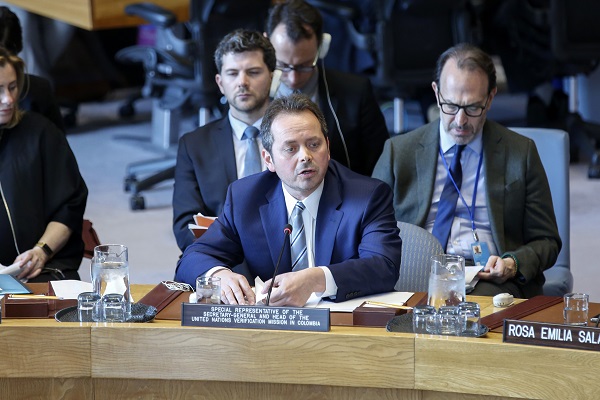United Nations, (Asian independent) The top UN envoy for Colombia, Carlos Ruiz Massieu, has hailed the encouraging political developments in Colombia and warned against persistent violence as an obstacle to the consolidation of peace in the country.
Over the past few months, Colombians took part in a hard-fought political campaign leading to the election of President Gustavo Petro and Vice-President Francia Marquez, who will be sworn in on August 7, and of a new Congress that will be installed on July 20, Massieu told the Security Council in a quarterly briefing on Thursday.
Electoral outcomes increasingly reflect the diversity of the country’s vibrant society. More guarantees exist now for exercising political opposition. And 16 representatives of victims from conflict-affected regions will have their voices heard in Congress. This too will be an unprecedented Congress in that it will include the largest-ever share of women lawmakers of close to 30 per cent of all Congress, he said.
“We hope the new Congress will make considerable progress in the passage of the more than 30 peace-related norms still pending approval, including on key matters such as the comprehensive rural reform and guarantees for political participation,” he said, the UN Secretary-General’s Special Representative and Head of the UN Verification Mission in Colombia.
He warned that violence remains a major obstacle in the way ahead, Xinhua news agency reported.
“Along with the reasons for encouragement we are also reminded constantly of the serious obstacles that remain to the consolidation of peace. Chief among them is the persisting violence against communities, against leaders and former combatants in several departments,” he added.
Four more former combatants were killed in the past two weeks, bringing the total number of former combatants killed to 331 since the signing of the peace agreement in 2016, under which the former members of the Revolutionary Armed Forces of Colombia voluntarily laid down their weapons, said Massieu.
“Their security must be guaranteed. A priority for any peace agreement must be to safeguard the lives of those who laid down their arms in good faith with the assurance that they would be protected.”
Illegal armed actors continue to target local leaders in conflict-affected areas marked by poverty, illicit economies and a limited presence of the state. Indigenous and Afro-Colombian communities are among the most seriously affected by the violence and insecurity, he added.
As the incoming administration prepares to take office, President-elect Petro has called for national unity and has expressed his intention to deepen the comprehensive implementation of the peace agreement, as well as to seek negotiated solutions, both political and judicial, with the remaining illegal armed actors, in what he has called the search for “total peace,” he said.
“Indeed, the incoming administration has a tremendous opportunity and responsibility to accelerate the implementation of the peace agreement. There are very good reasons for optimism, and I believe the UN and the international community at large should do all they can to lend their support,” Massieu added.








